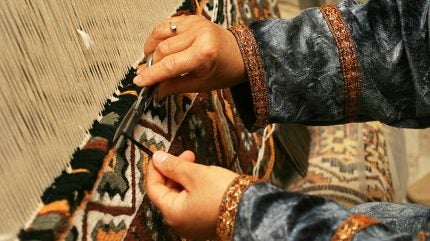
The agreement will see the minimum wage rise from Jd220 ($324.27) to Jd230 starting 1 January 2025, according to the Jordan News Agency Petra.
The pact was signed by the Jordan Garment and Textile Exporters Association, the General Union of Knitwear Owners, and the General Union of Workers in Textile Spinning.
Minister of Labour Khaled Bakkar oversaw the agreement’s formalisation.
Bakkar said that it includes a stipulation for a yearly wage increment of Jd5 for the workforce.
In addition, workers from companies that do not offer transport services will see their travel subsidies increased to Jd25 monthly.
The minister pointed out that around 24,000 local workers in this industry stand to gain from this accord. The benefits include healthcare access through on-site medical facilities, travel subsidies, and food provisions made available by certain employers.
“Non-Jordanian workers in the sector will also benefit from these enhancements,” the news agency quoted the minister as saying.
Bakkar underscored the Labour Ministry’s dedication to ensuring a balance between employer and worker interests and it is said to be actively promoting cooperation between both parties to bolster workplace stability and economic productivity.
He also shared initiatives aimed at localising development in rural areas to provide job opportunities closer to home, thereby reducing migration towards urban hubs.
General Union of Textile Spinning Workers head Fathallah Omrani expressed optimism regarding the wage increase’s potential to elevate productivity and worker satisfaction.
He reaffirmed the union’s dedication to collaborating with the ministry and industry partners to expand job prospects, improve factory performance, and increase export volumes efforts that are integral to bolstering Jordan’s economic prosperity.
According to Ihab Qadri, a representative of the sector in the Jordan Chamber of Industry (JCI), Jordan’s leather and textile industry generated 1,500 jobs in the first nine months of this year. Qadri also noted that the number of Jordanian workers in the sector rose by 4% compared to the previous year.
Jordan’s textile and leather industry continues to be a significant exporter, producing items such as ready-made garments, embroidery, carpets, rugs, and footwear. The sector is now directing its efforts towards products with higher added value.
Qadri also provided insights into the industry’s financial performance. In 2024’s second quarter, Jordan’s textile and leather industries saw an 11.8% year-on-year growth.
Furthermore, exports from these sectors soared by 20.3% in the first eight months of 2024, reaching over Jd1.161bn compared to Jd965m during the same timeframe in the previous year.
Jordan benefits from preferential access to the US market, including exemptions from certain customs duties and taxes through the United States-Jordan Free Trade Agreement (FTA) signed in 2000.



